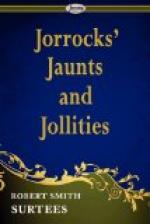The peals of a bright brass-handled bell at a garden-gate, surmounted by a holly-bush with the top cut into the shape of a fox, announced their arrival to the inhabitants of “Rosalinda Castle,” and on entering they discovered young Nosey in the act of bobbing for goldfish, in a pond about the size of a soup-basin; while Nosey senior, a fat, stupid-looking fellow, with a large corporation and a bottle nose, attired in a single-breasted green cloth coat, buff waistcoat, with drab shorts and continuations, was reposing, sub tegmine fagi, in a sort of tea-garden arbour, overlooking a dung-heap, waiting their arrival to commence an attack upon the sparrows which were regaling thereon. At one end of the garden was a sort of temple, composed of oyster-shells, containing a couple of carrier-pigeons, with which Nosey had intended making his fortune, by the early information to be acquired by them: but “there is many a slip,” as Jorrocks would say.
Greetings being over, and Jorrocks having paid a visit to the larder, and made up a stock of provisions equal to a journey through the Wilderness, they adjourned to the yard to get the other dog, and the man to carry the game—or rather, the prog, for the former was but problematical. He was a character, a sort of chap of all work, one, in short, “who has no objection to make himself generally useful”; but if his genius had any decided bent, it was, perhaps, an inclination towards sporting.
Having to act the part of groom and gamekeeper during the morning, and butler and footman in the afternoon, he was attired in a sort of composition dress, savouring of the different characters performed. He had on an old white hat, a groom’s fustian stable-coat cut down into a shooting-jacket, with a whistle at the button-hole, red plush smalls, and top-boots.
There is nothing a cockney delights in more than aping a country gentleman, and Browne fancied himself no bad hand at it; indeed, since his London occupation was gone, he looked upon himself as a country gentleman in fact. “Vell, Joe,” said he, striddling and sticking his thumbs into the arm-holes of his waistcoat, to this invaluable man of all work, “we must show the gemmem some sport to-day; vich do you think the best line to start upon—shall we go to the ten hacre field, or the plantation, or Thompson’s stubble, or Timms’s turnips, or my meadow, or vere?” “Vy, I doesn’t know,” said Joe; “there’s that old hen-pheasant as we calls Drab Bess, vot has haunted the plantin’ these two seasons, and none of us ever could ’it (hit), and I hears that Jack, and Tom, and Bob, are still left out of Thompson’s covey; but, my eyes! they’re ’special vild!” “Vot, only three left? where is old Tom, and the old ramping hen?” inquired Browne. “Oh, Mr. Smith, and a party of them ’ere Bankside chaps, com’d down last Saturday’s gone a week, and rattled nine-and-twenty shots at the covey, and got the two old ’uns; at least it’s supposed they were both killed, though the seven on ’em only bagged one bird; but I heard they got a goose or two as they vent home. They had a shot at old Tom, the hare, too, but he is still alive; at least I pricked him yesterday morn across the path into the turnip-field. Suppose we goes at him first?”




